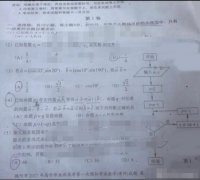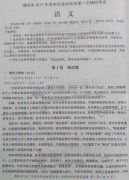2015揭阳一模英语试题及答案【word版】(2)
II.阅读(共两节,满分50分)
第一节 阅读理解 (共20小题;每小题2分,满分40分)
阅读下列短文,从每题所给的A、B、C和D项中,选出最佳选项,并在答题卡上将该项涂黑。
A
“I think it’s a great thing when I know it’s going to help someone else.” said l3-year-old Spencer Goldstein, after collecting hundreds of pieces of baseball equipment for kids who can not afford to buy their own.
Spencer collected the bats, balls, gloves, helmets and masks for his mitzvah(德行)project, which is a community service project that many Jewish kids do around their bar or bat mitzvahs(成人礼). A bar mitzvah is a ceremony for a boy while a bat mitzvah is intended for a girl. The ceremony means that you are old enough to take on a grown-up’s responsibilities.
Spencer got the idea for his mitzvah project after seeing the Ugandan national team at last year’s Little League World Series. Some of the Ugandan players didn’t even have their own gloves. And Spencer’s donations are going to a group called “Pitch for Baseball”——a group that gives baseball equipment to kids in low-income communities around the world.
Mollie Schwartz and Mia Schwartz also came up with a sports-related mitzvah project. The money they raised went to the Israel Sport Center for the Disabled. They raised at least $9,000——enough to pay for at least three wheelchairs made for playing basketball.
In Massachusetts, Abigail Miller decided to collect musical instruments for her mitzvah project. The instruments Abigail collected were then donated to groups that distribute them to kids who can’t afford to buy them. “I want to make sure everybody can get the chance to enjoy music like I do,” Abigail said. Abigail collected more than three-dozen instruments——wind instruments, string instruments, keyboards, and even a drum set.
Whether it’s playing sports, playing music or something else, kids such as Spencer, Mollie, Mia and Abigail are using their mitzvah projects to change the world for the better. “They learned about generosity, ’’ said Mollie’s mother, Loft Schwartz, “and the power to make things happen”.
26. How did Spencer feel after collecting some baseball equipment?
A. Tired. B. Proud. C. Confident. D. Upset.
27. Spencer planned to begin to collect baseball equipment .
A. when he was only thirteen years old
B. after he found his classmates still living in poverty
C. when he found a group offering equipment to others
D. after he saw some players wearing no gloves
28. What do we know about Abigail Miller from the text?
A. She helped many kids have fun with music through her efforts.
B. She hoped more things would be given to those kids.
C. She sent the things she collected directly to those in need.
D. She collected sports equipment for the disabled.
29. From the passage we can know .
A. some kids are famous for their funny projects
B. the requirements are different for boys and girls
C. few girls are willing to do the mitzvah projects
D. not all mitzvah projects are related to sports
30. What can we learn from the text?
A. Determination. B. Bravery. C. Generosity. D. Honesty.
B
If you saw another kid ride her bike too fast around a corner and fall down, you might ride your bike more slowly on that turn. Yes, we humans are very sensitive to others’ mistakes. And the same is true for other animals. Animals mess up all the time. They might eat poisonous leaves, fall off a tree or let their prey(猎物) slip away. By watching others fail, an animal can avoid making the same mistakes, thus improving its chance of survival.
Scientists suspected that one part of the brain helps animals process information about others’ errors. Cells in that part appear to become more active when a person sees someone else making a mistake. But researchers didn’t know whether individual cells in this part of the brain play different roles in detecting errors.
To investigate the brain’s response to errors in more detail, the researchers taught a game to two macaques, a type of monkey. One monkey could press a yellow or green button while the other watched. If the first monkey pressed the right button, the team gave both animals a treat. Every couple of rounds, the two monkeys switched roles. Meanwhile, the scientists monitored individual cells in the animal’s brains.
When the first monkey messed up the game by pressing the wrong button, a group of cells in the second monkey’s brain fired. But if the second monkey also made the wrong choice during its turn, some of the cells in that group didn’t respond. Those unresponsive cells reacted specifically to mistakes made by others, not to the monkey’s own mistakes.
Scientists believe other parts of the brain also might help people process information about another’s errors. “You start to think about this other person and see things from his angle.” Ellen de Bruijn told Science News. She studies the brain at the University of Leiden in the Netherlands.
31. According to Paragraph l, animals’ ability to learn from others’ mistakes .




